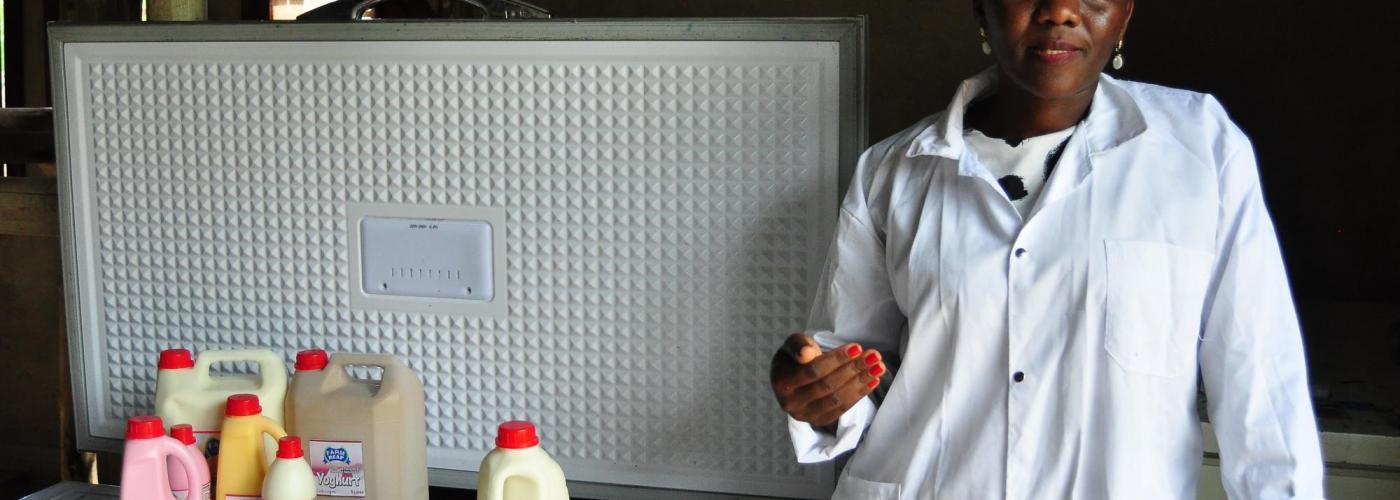Acceleration in the Time of COVID-19: Supporting Female Entrepreneurs Through the Pandemic
Image

Similar to many small business owners around the world, Sylvia Natukunda is feeling the effects of COVID-19. As the founder of Farm Reap, a Kampala, Uganda-based company that produces five flavors of yogurt, she is putting together a game plan on how to keep her business profitable.
As she does, she will have expert assistance at her side thanks to the Feed the Future Growing Women’s Entrepreneurship (GroWE) award that she received just last month. She recalled feeling “elated” when she learned the news that she won, and is eager for the opportunity to grow her business. Even though the business landscape changed seemingly overnight, Sylvia’s determination remains steadfast. Through the award, which aims to address challenges faced by women-owned or operated businesses in emerging markets and help accelerate their growth, she is currently working with Challenges Uganda, a local business service provider. Together, they are developing customized strategies to help her pivot her business plan in the face of the pandemic while also identifying long-term ways to take her company to the next level.
In recent weeks, the government of Uganda instituted a nationwide curfew, required non-essential businesses to close, and restricted the movement of people. While food producers like Farm Reap are still permitted to operate, these restrictions are still significantly affecting her company’s ability to produce, distribute, and market its yogurts. For example, she has noted a reduction in demand and sales as some supermarkets close and others shift inventory toward less perishable items that are higher in demand. That’s a dramatic change for her business, as she typically sells her yogurts in a variety of sizes at nearly 100 locations across the city. Movement restrictions have also had financial impacts — it is harder to collect payments from retailers who purchased yogurt on credit, and more difficult to access financial services due to bank closures.
In response to the restrictions and uncertainty caused by the COVID-19 pandemic, Sylvia decided to scale back her business and operate at half its normal capacity. Currently, Farm Reap is only producing yogurt based on orders received from select pre-existing supermarket clients. As the shutdown continues, she expects there will be significant impacts on revenue and is proactively testing new business models to counteract this. For instance, instead of selling only to supermarkets, Sylvia plans to sell directly to individual consumers and has started leveraging social media and other online platforms to promote her products.
Partnering for Innovation and Challenges Uganda are working closely to support Farm Reap in navigating these unexpected challenges by integrating a resilience component into the acceleration services we are providing. Challenges Uganda will conduct a resilience diagnostic to evaluate Farm Reap’s current strengths, weaknesses, and risks in responding to economic shocks such as COVID-19. The firm will also help Farm Reap evaluate its revenue streams and costs while providing strategic guidance on the best business models to pursue.
Small businesses like Farm Reap are disproportionately impacted by economic shocks, including those already being caused by COVID-19. This impact is compounded for female entrepreneurs who often face less favorable terms for financing and limited access to markets, market information, and digital technology. Development practitioners and accelerators play a pivotal role in ensuring that small and growing businesses are able to successfully adapt and respond to shocks and stressors so their products can continue serving customers and markets for years to come.

